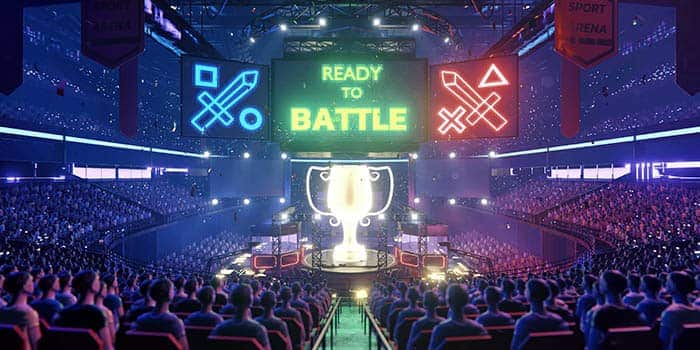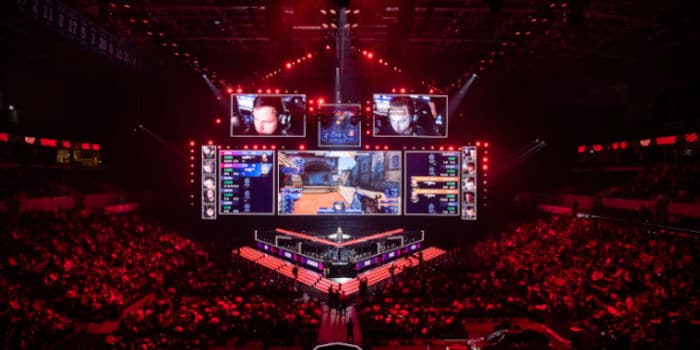- Casino
- By State
- Alabama
- Alaska
- Arizona
- Arkansas
- California
- Colorado
- Connecticut
- Delaware
- Georgia
- Florida
- Hawaii
- Idaho
- Illinois
- Indiana
- Iowa
- Kansas
- Kentucky
- Louisiana
- Maine
- Massachusetts
- Maryland
- Michigan
- Minnesota
- Mississippi
- Missouri
- Montana
- Nebraska
- Nevada
- New Hampshire
- New Jersey
- New Mexico
- New York
- North Carolina
- North Dakota
- Ohio
- Oklahoma
- Oregon
- Pennsylvania
- Rhode Island
- South Carolina
- South Dakota
- Tennessee
- Texas
- Utah
- Vermont
- Virginia
- Washington
- West Virginia
- Wisconsin
- Wyoming
- By State
- Slots
- Poker
- Sports
- Esports
China to Recognize Esports Players and Managers as Professions

China’s Ministry of Human Resources and Social Security is proposing 15 new professions, including esports event managers and esports players.
China Recognizes Esports Managers and Players as a Profession
The Ministry of Human Resources and Social Security of China is planning to introduce 15 new career paths, including esports athletes and esports managers. The list has been put up for public debate until January 31.
According to bilingual Chinese sources, the news was picked up by social media with people openly stating that they would like to pursue such career opportunities while others cautioned to differentiate between esports fans and actual professional players.
Multiple Chinese-facing sources cited the following Weibo user Yang Laosi:
It is understandable that esports players are included on the preliminary list, but those in this category need to be true professionals rather than just video game fans.
Esports has been expanding in China, with the country hosting some of the most notable esports events, including Dota 2’s The International 9 in Shanghai this year and the now concluded Chongqing Major. The League of Legends’ 2020 World Championship is to be held in China next year.
Do You Need a License to Practise Esports?
Bizarre as it sounds, obtaining a professional status for esports players could benefit the industry as a whole. There are multiple benefits of giving a more official status to competitive video gaming, from sorting out visas to helping players earn a living while playing without feeling unnecessary pressure that their livelihood is on the line.
It can perhaps be argued that esports remuneration and prize pools should only go to the best in their respective fields, but guaranteeing a minimum income for talented players may eventually see new competitors make it to the top.
One good example is how the NBA 2K League treats its players, with the competitive format offering players salaried positions around $32,000 yearly.
With respect to tackling visa issues, giving a more formal status to esports professionals may just make enough sense. However, this is purely speculation, as the Ministry of Human Resources and Social Security hasn’t released any details why it seeks to give a formal status to esports athletes.
Japan Recognizes Esports Professionals
Japan has started opening up to the idea of competitive esports just recently. The country created the Japan Esports Union (JESU) at the turn of 2018, with the body tasked with popularizing esports in the country.
https://www.gamblingnews.com/news/twitch-confirms-it-has-been-blocked-in-china/
Since the beginning of 2018, the Japanese esports industry has increased 13 times its 2017 levels, to $42.3 million last year, a slightly unlikely figure given the fairly restrictive gaming climate.
However, JESU has been actively seeking to promote esports in the country, successfully fielding Japanese VS Asian competitors (as the teams were divided by the organizers) in the Challenge Cup.
Esports athletes in Japan also need to obtain a license and register themselves as players if they want to participate. The move was introduced back in February 2018 and it constituted a seismic shift in the overall gaming landscape.
Gzbrain Inc. Vice President Hirokazu Hamamura commented that Japan has the potential to catch up to the rest of the world in terms of esports talent:
This is the first big step. What’s really important for the esports movement is whether our players can become stars. And I think that’s coming.
Esports were also premiered as a test discipline at the 2018 Southeast Asia Games held in Jakarta, Indonesia. This year, esports is an official medaled discipline and the games are taking place in the Philippines later in 2019.
China and Japan Not Quite the Same
Chinese gamers haven’t faced quite the same restrictions as their Japanese counterparts. Tencent, one of the big publishers in the country, reported back in June 2018 that the esports market in China will reach $1.5 billion in 2020.
Still, another seemingly positive change for the Chinese esports climate is a relief, after China spent the latter half of 2018 targeting video games over “impropriety” and more.
Related Topics:
As an avid follower of sports and the newly recognized industry of esports, Heidi uses her expertise to help the team push out the best sports content. She is also continually learning more about the gambling industry in general and pushes out a variety of content.
More Articles




